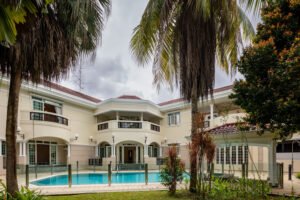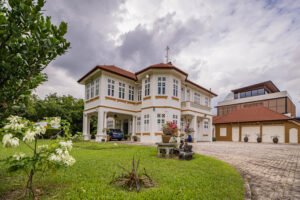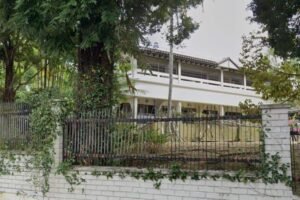AMID the current lull in high-end landed residential property transactions, a bungalow along White House Park is being sold for S$45.5 million, which works out to S$3,017 per square foot on the freehold land area of 15,081 sq ft.
Located a short distance from the Singapore Botanic Gardens, the property is being bought by Singaporean Fu Wei, the chief executive of healthcare-dedicated investment firm CBC Group. The seller is a Singapore-incorporated company owned by a Sia family.
On site is a bungalow that is said to have been rebuilt around 2003.
William Wong, founder of Realstar Premier, which was not involved with the transaction, describes the S$3,017 psf as reasonable, given that redevelopment land for a typical Good Class Bungalow (GCB) in that locale on flat land would cost about S$2,500-3,000 psf currently.
“In the case of this particular bungalow, it is on land that cascades downwards, which could make construction of a new property on the site more challenging. That said, the house is in liveable condition. If the existing bungalow were sitting on flat land, the property would have fetched at least S$50 million (S$3,315 psf on land area).
“For a brand-new GCB in White House Park on flat land (of about 15,000 sq ft) today, most owners would be expecting a price of at least $80 million (or about S$5,300 psf on land),” he added.
While this looks pricey, Wong says that those developing bungalows in prime GCB Areas tend to maximise the built-up area by building a 2-storey bungalow with an attic plus 2 basements; this could easily result in about 30,000 sq ft built-up area for a site of about 15,000 sq ft. “So on built-up area basis, a price tag of S$80 million works out to S$2,600-2,700 psf, which seems reasonable compared with buying a freehold high-end condo or penthouse.”
Fu founded CBC Group in 2014, growing its assets under management from US$180 million to over US$5 billion in the past 8 years. CBC has invested in and incubated several biotech and pharmaceutical companies, including I-Mab Biopharma and Everest Medicines, which have gone public.
In Singapore, it founded mRNA biopharma company RVAC Medicines, which aims to address diseases in the emerging markets through novel vaccines and therapeutics.
Fu graduated with a degree in electrical and electronic engineering from Nanyang Technological University and began working for Temasek shortly after. Before starting CBC, he was the general manager of the investment department at a wholly owned subsidiary of Far East Horizon. He also worked at Standard Chartered Bank (China) and Macquarie Capital (Singapore).
Bungalows in the 39 gazetted GCB Areas are the most prestigious form of landed housing in Singapore, with strict planning conditions stipulated by the Urban Redevelopment Authority (URA) to preserve their exclusivity and low-rise character.
The URA has stipulated a minimum plot size of 1,400 square metres (about 15,070 sq ft) as the planning norm for newly-created bungalows in GCB Areas. One generally has to be a Singapore citizen to be allowed to buy a landed property in a GCB Area.
Sentosa Cove
The waterfront residential enclave of Sentosa Cove is the only place in the Republic where foreigners, even if they are not Singapore permanent residents (PRs), may seek approval to buy a landed home for their own use. Last month, an option to buy a waterway-facing villa along Ocean Drive was exercised at S$34.5 million. The price works out to S$2,016 psf on the land area of 17,110 sq ft. The land tenure is 99 years from March 2004, leaving about 80.5 years’ balance lease.
The buyer is understood to be China citizen and Singapore PR Wang Junmin, the chairman of Haisco Pharmaceutical Group. Based in Shannan, Tibet, the group’s activities include the manufacture and sale of drug formulations and active pharmaceutical ingredients.
List Sotheby’s International Realty’s (List SIR) senior associate vice-president Steve Tay said: “Following Singapore’s relaxation of most of its Covid-19 control measures in April, I have seen more Asian buyers house hunting in Sentosa Cove; some of them have decided to base their families here for their children’s education and as a hub for their business to operate in the Asia-Pacific region.”
Notwithstanding the fact that bungalows in Sentosa Cove are on sites with 99-year leasehold tenures, they are limited in supply, with just about 350 of them, he added.
List SIR research director Han Huan Mei, attributes the decline in the number of high-end bungalow transactions – in both Sentosa Cove and the GCB Areas – during the first half of this year compared with the year-ago period to potential buyers holding back their purchase in view of the global uncertainties on both the geopolitical and economic fronts and the risk of looming recession.
Tay adds that in the case of the GCB market, another key factor for the slower pace of transactions has been the widening buyer-seller price gap. “That said, sellers who are willing to price their properties more reasonably, have still been able to find takers.”




